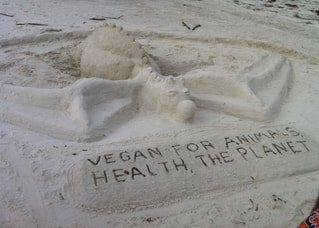
I've been hearing a lot lately about a new technological advancement that will allegedly save untold numbers of animals and reduce the egregious carbon footprint of meat. It's called cultured meat. Proponents claim that by using a few cells from a cow, pig, chicken or fish and applying cutting edge biotechnology, it will soon be possible to make those cells grow into meat for humans to eat without having to actually raise and then kill an entire animal.
Multiple start-ups have jumped on this idea, and investors are lining up. While the hype proliferates, it's hard to find much transparency from most of the companies trying to lure investors. Without digging deep, you'd be inclined to think we are on the verge of producing meat obtained without having to engage in violence against other beings. But that is not the case.
That's why I have been disheartened to see well-meaning animal advocates jump on the bandwagon to promote cultured meat. Lured by promises of saving animals and then given salaries that make it less likely they will ask hard questions, some animal advocates are now collaborating with animal exploiters -- talk about a conflict of interest. At the present time, producing cultured meat requires ongoing infusion of serum from slaughtered animals, meaning ongoing violence is required to produce it. Proponents claim that this hurdle has been theoretically overcome -- but to my knowledge, no one has yet made this work. Meanwhile, most of the start-ups remain vague about what they are actually doing while trying to avoid real transparency. But one entity, The Cultured Meat Foundation is being honest and is openly disclosing some major hurdles that currently have no solution. But if history is any guide -- the exploitating industries need not worry about this --if they can get some well-meaning animal advocates to collaborate, or to endorse this product they will be more likely to persuade a skeptical public to overcome their revulsion to this technology and buy it.
Once that happens, producers of cultured meat may be less motivated to solve the problem of needing an ongoing supply of newly slaughtered animals to produce it. That won't matter once they have enough people willing to eat it, it will be profitable. But what will matter is that decades of work by grass-roots activists committed to raising awareness that we can live better lives and have more peace and justice by embracing authentic veganism, could be co-opted and neutralized.
Meanwhile, the very people who are likely to be the most resistant to give up eating meat -- the passionate grass-fed, or "natural" crowd will be the hardest to convince to eat cultured meat -- which they rightly view as a cousin of GMO's.
Cultured meat, yellow rice, cage-free eggs -- all three of these are PR wins for egregiously unjust industries. In each case, these are touted to justify, what are otherwise terrible injustices. They serve to placate an undereducated or ethically numbed public, and are highly effective PR even if they never actually live up to their promises. Just look at yellow rice. For over 20 years GMO companies have pointed to it as justification that GMO's can save humanity. But yellow rice has never actually prevented vitamin A deficiency in any population, because major technical problems have never been solved -- but pro-GMO folks for two decades now have held it up as THE example that some GMO foods can actually be good for humanity -- and not just shareholders. (The evidence shows otherwise.) Cage-free eggs is another example. Praised by some animal-advocating groups as better than eggs from battery caged hens, the term cage-free has made it ok for some who claim to care about animals, to continue to economically support exploitation of chickens, while changing the conversation from the injustice of enslaving other beings to condoning enslaving them when it is done with less torture.
Now we have proponents of cultured meat justifying their support of this new technology by suggesting it will help our population transition away from harming animals. To substantiate their perspective they like to point out how development of the automobile (technology) helped animals because it made possible the elimination of the horse and buggy, which was so terrible for horses. So let's take a closer look at the horse and buggy analogy. How many of those who use this example have actually asked this question...Did replacing the horse and buggy with the automobile really result in less harm to animals? Consider how many animals are in fact killed by cars. Consider how the rapid proliferation of highways that must be built for cars impede's migration of many animals. Consider the necessity of fossil fuel to run cars and the devastation that extracting these fuels has heaped upon marine ecosystems and caused many other harms to the environment -- all of which have caused great harm to animals. It is clear that replacing the horse and buggy with the automobile exponentially increased the harms to animals.
At the present time, cultured meat requires violence against other beings, and genetic engineering has no place in a healthy, just food supply. Please if you care about animals and justice for all, work for veganism, not cultured meat and GMO foods.
Multiple start-ups have jumped on this idea, and investors are lining up. While the hype proliferates, it's hard to find much transparency from most of the companies trying to lure investors. Without digging deep, you'd be inclined to think we are on the verge of producing meat obtained without having to engage in violence against other beings. But that is not the case.
That's why I have been disheartened to see well-meaning animal advocates jump on the bandwagon to promote cultured meat. Lured by promises of saving animals and then given salaries that make it less likely they will ask hard questions, some animal advocates are now collaborating with animal exploiters -- talk about a conflict of interest. At the present time, producing cultured meat requires ongoing infusion of serum from slaughtered animals, meaning ongoing violence is required to produce it. Proponents claim that this hurdle has been theoretically overcome -- but to my knowledge, no one has yet made this work. Meanwhile, most of the start-ups remain vague about what they are actually doing while trying to avoid real transparency. But one entity, The Cultured Meat Foundation is being honest and is openly disclosing some major hurdles that currently have no solution. But if history is any guide -- the exploitating industries need not worry about this --if they can get some well-meaning animal advocates to collaborate, or to endorse this product they will be more likely to persuade a skeptical public to overcome their revulsion to this technology and buy it.
Once that happens, producers of cultured meat may be less motivated to solve the problem of needing an ongoing supply of newly slaughtered animals to produce it. That won't matter once they have enough people willing to eat it, it will be profitable. But what will matter is that decades of work by grass-roots activists committed to raising awareness that we can live better lives and have more peace and justice by embracing authentic veganism, could be co-opted and neutralized.
Meanwhile, the very people who are likely to be the most resistant to give up eating meat -- the passionate grass-fed, or "natural" crowd will be the hardest to convince to eat cultured meat -- which they rightly view as a cousin of GMO's.
Cultured meat, yellow rice, cage-free eggs -- all three of these are PR wins for egregiously unjust industries. In each case, these are touted to justify, what are otherwise terrible injustices. They serve to placate an undereducated or ethically numbed public, and are highly effective PR even if they never actually live up to their promises. Just look at yellow rice. For over 20 years GMO companies have pointed to it as justification that GMO's can save humanity. But yellow rice has never actually prevented vitamin A deficiency in any population, because major technical problems have never been solved -- but pro-GMO folks for two decades now have held it up as THE example that some GMO foods can actually be good for humanity -- and not just shareholders. (The evidence shows otherwise.) Cage-free eggs is another example. Praised by some animal-advocating groups as better than eggs from battery caged hens, the term cage-free has made it ok for some who claim to care about animals, to continue to economically support exploitation of chickens, while changing the conversation from the injustice of enslaving other beings to condoning enslaving them when it is done with less torture.
Now we have proponents of cultured meat justifying their support of this new technology by suggesting it will help our population transition away from harming animals. To substantiate their perspective they like to point out how development of the automobile (technology) helped animals because it made possible the elimination of the horse and buggy, which was so terrible for horses. So let's take a closer look at the horse and buggy analogy. How many of those who use this example have actually asked this question...Did replacing the horse and buggy with the automobile really result in less harm to animals? Consider how many animals are in fact killed by cars. Consider how the rapid proliferation of highways that must be built for cars impede's migration of many animals. Consider the necessity of fossil fuel to run cars and the devastation that extracting these fuels has heaped upon marine ecosystems and caused many other harms to the environment -- all of which have caused great harm to animals. It is clear that replacing the horse and buggy with the automobile exponentially increased the harms to animals.
At the present time, cultured meat requires violence against other beings, and genetic engineering has no place in a healthy, just food supply. Please if you care about animals and justice for all, work for veganism, not cultured meat and GMO foods.

